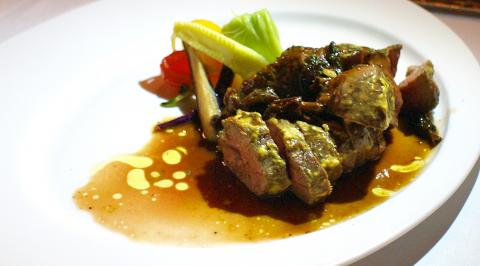Jay Chou’s (周杰倫) restaurant Deja Vu, I thought to myself as I entered it last weekend, will probably follow one of two trajectories, much the same way his career in the entertainment industry has. It will either be a resounding success like the pop music that has made him a household name, or it will be a dud like Pandamen (熊貓人), the television drama he directed that was universally panned by critics and audiences because of its goofy premise and trite plot.
Opened last summer in Huashan 1914 Creative Park (華山1914), Deja Vu at first feels like a finely crafted work of art. With its vaulted arcades supported by stone columns and exposed cement walls adorned with framed paintings of landscapes and portraits of renowned composers, it is immediately appealing. As you move further in, however, it’s Pandamen all the way. The oil paintings are in fact posters and the sumptuous architectural flourishes are offset incongruously by Chou’s gigantic Batmobile, its black surface reflecting the interior’s kaleidoscope of crass disco lighting.
Sure, the Batmobile is sleek and cool and something you’ve probably never seen before, but a car doesn’t belong in the center of a dining room. During my visit, several amateur photographers went up to snap the auto (this reviewer included), bumping chairs and setting off flashbulbs in the process.

Photo: Noah Buchan, Taipei Times
Kitschy movie set production values aside, our party of nine was still prepared to give the service and food the benefit of the doubt. And like the design, the service started out well.
When our party ordered the seafood pizza (NT$480), our server, dressed in formal black, suggested another dish because we had already ordered the seafood risotto (NT$680 for two), which contains similar ingredients. For the first 15 minutes, or so, our water glasses remained full. But when asked if the pasta with clams contained white wine, our server said she didn’t know and she didn’t bother to check. After our main courses were served, our water glasses were not filled up. That was disappointing because the dishes were over-seasoned with salt. This was especially true of the potato and sausage pizza (NT$360) and spaghetti with garlic and clams (NT$420). Both were presented beautifully, but the thin-crust pizza was flavorless and soggy. The pasta, cooked to al dente perfection, contained too much garlic, which overpowered the subtler flavor of the clams.
For many of the dishes, we wondered what we were paying for. The portions of the tapas for two (NT$420), with its array of smoked salmon, foie gras, salami, seasoned octopus and pickled artichoke and garlic, were laughably small and it was obvious that much of it had come from a packet.
Whereas the pizza and pasta left us pining for water, the oven-baked lamb with herb and mustard wine sauce (NT$780) barely registered on the taste buds. The meat was baked to a rosy red hue and tastefully arranged on the plate, but the sauce was bland and the vegetable portions a miniscule and overcooked afterthought. The seafood risotto is the only dish I would consider ordering again. With its generous portions of scallops, shrimp, clams and crabmeat cooked in a buttery white wine sauce, it was a unanimous favorite.
Deja Vu seems to be playing off the fame of its owner. Go for the car, but not the food.

That US assistance was a model for Taiwan’s spectacular development success was early recognized by policymakers and analysts. In a report to the US Congress for the fiscal year 1962, former President John F. Kennedy noted Taiwan’s “rapid economic growth,” was “producing a substantial net gain in living.” Kennedy had a stake in Taiwan’s achievements and the US’ official development assistance (ODA) in general: In September 1961, his entreaty to make the 1960s a “decade of development,” and an accompanying proposal for dedicated legislation to this end, had been formalized by congressional passage of the Foreign Assistance Act. Two

Despite the intense sunshine, we were hardly breaking a sweat as we cruised along the flat, dedicated bike lane, well protected from the heat by a canopy of trees. The electric assist on the bikes likely made a difference, too. Far removed from the bustle and noise of the Taichung traffic, we admired the serene rural scenery, making our way over rivers, alongside rice paddies and through pear orchards. Our route for the day covered two bike paths that connect in Fengyuan District (豐原) and are best done together. The Hou-Feng Bike Path (后豐鐵馬道) runs southward from Houli District (后里) while the

March 31 to April 6 On May 13, 1950, National Taiwan University Hospital otolaryngologist Su You-peng (蘇友鵬) was summoned to the director’s office. He thought someone had complained about him practicing the violin at night, but when he entered the room, he knew something was terribly wrong. He saw several burly men who appeared to be government secret agents, and three other resident doctors: internist Hsu Chiang (許強), dermatologist Hu Pao-chen (胡寶珍) and ophthalmologist Hu Hsin-lin (胡鑫麟). They were handcuffed, herded onto two jeeps and taken to the Secrecy Bureau (保密局) for questioning. Su was still in his doctor’s robes at

Mirror mirror on the wall, what’s the fairest Disney live-action remake of them all? Wait, mirror. Hold on a second. Maybe choosing from the likes of Alice in Wonderland (2010), Mulan (2020) and The Lion King (2019) isn’t such a good idea. Mirror, on second thought, what’s on Netflix? Even the most devoted fans would have to acknowledge that these have not been the most illustrious illustrations of Disney magic. At their best (Pete’s Dragon? Cinderella?) they breathe life into old classics that could use a little updating. At their worst, well, blue Will Smith. Given the rapacious rate of remakes in modern